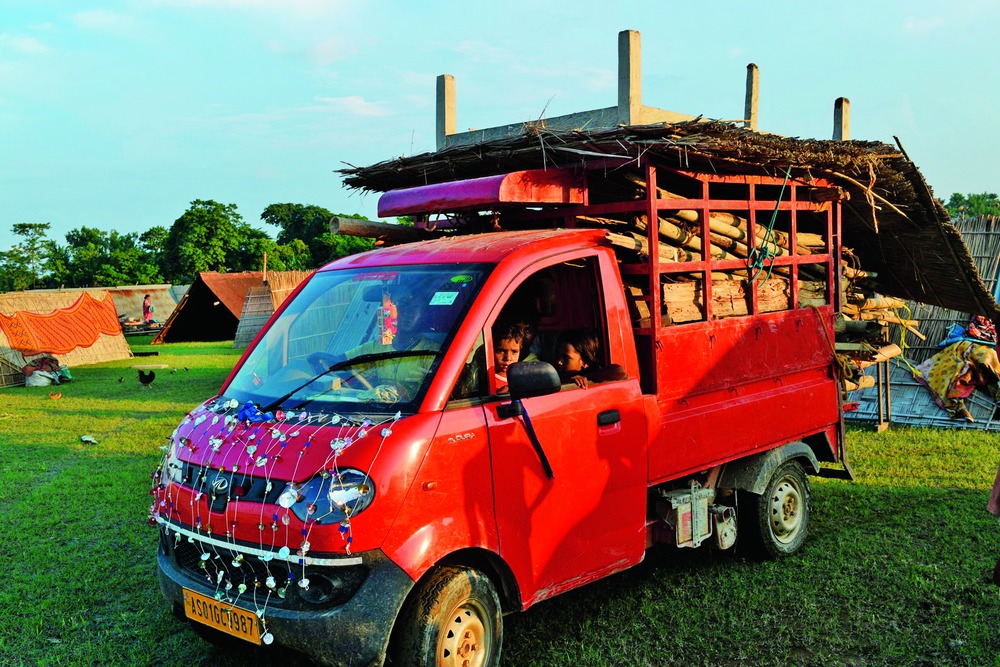
Hiloikhunda (Darrang), Sept. 23: Little Roshana struggles to carry a moulded plastic chair on her frail shoulders while an elderly couple try equally hard to lift a bed before carting it away; a couple of siblings are overjoyed as they get a rare ride in a pick-up van carrying their family’s few but precious belongings.
Over the past two days, the residents of this village, barring the toddlers, have been engaged in only one activity: dismantling their houses and taking the building materials a couple of hundred metres away and stacking them in neat piles.
Hiloikhunda, about 35km east of Guwahati and rubbing shoulders with Mayong, the famed land of black magic in Morigaon district, has for the past 16-17 years been home to a people whose domicile has been dictated by the Brahmaputra.
The river took the land away from under their feet at Tarabari in Barpeta district in the late sixties, forcing them to move eastward, scouring the river for sars (sandbars). They found Gasorbari in Darrang district and rebuilt their homes. About three decades later, they tore down their houses once again as the river returned to swallow the sar. They crossed the river to the south and landed at Hiloikhunda in Darrang district and adjacent Hatimuria (in Morigaon district).
Now it is time for them to move again.
This time, though, it is not the Brahmaputra that has been at their heels, but people with whom they have lived cheek by jowl and, as they claim, in complete harmony for the past 15-16 years.
“They have to move because there is social tension in the area and, anyway, they are encroachers,” a Darrang district administration official explained.
The “social tension” erupted on August 14 when their years-long neighbours, who had earlier asked them to go away, fenced off the only road leading from Hiloikhunda to Mayong Bazar. In the confrontation that followed, two persons were injured from either side. The fence, erected next to the Ganesh temple, fell.
The residents of Hiloikhunda went back to using the road, but threats of eviction allegedly kept coming, prompting them to move Gauhati High Court. Besides, the Darrang district administration had in 2013 allowed them to stay at Hiloikhunda temporarily. The petition to the court mentioned 260 families as affected.
In its order on September 6, the court, by way of an “interim measure”, said the “genuine erosion-affected families who had earlier been allowed to occupy government land in terms of the order dated October 4, 2013 shall not be evicted except by following the due process of law”.
Darrang deputy commissioner, Ashok Barman said the people would have to fend for themselves.
A.R. Sikdar, counsel for the petitioners, is surprised that the residents have started dismantling their houses since the order was for a month. “Maybe they are apprehending forced eviction,” he said.
There has been a buzz in a section of the media about Mayong being the next target for eviction after Kaziranga. These reports also refer to them as “suspected citizens (read Bangladeshis)”.
The ruling BJP had promised to evict encroachers if it came to power. The residents of Hiloikhunda and their ilk have all along lived with two B-words: Brahmaputra and Bangladeshi.
“We have learned to live with the Brahmaputra; it is like a hide-and-seek game,” says Based Ali, unperturbed by the prospect of having to move yet again. At 25, he says he has already moved several times, either pushed by the Brahmaputra or circumstances. “What we can’t live down is the tag of being Bangladeshis,” says Abu Sama, an elderly resident. “What more documents do you want from us to prove that we are genuine Indians?” he asks. “No, the government does not say we are Bangladeshis, but the scaremongers and, unfortunately, they include intellectuals, lawyers, various organisations and a section of the media,” he says. “We will be the first to drive away a Bangladeshi if we find any among us,” he asserts.
A group of about 10 people goes by, carrying a thatched roof to add to the accumulating piles of belongings.
“They have the roof, but can’t sleep under it because we have been asked not to rebuild houses on this new patch of land. It is only for holding our articles till we depart,” says Motleb Ali. “Hope we can live with a modicum of dignity,” he adds.
As her menfolk busy themselves arranging their belongings, 50-year-old Mohshina Khatun manages to find a place to cook their lunch. “Let us see where we can have our next meal,” she says, putting a lid on the kadhai.
The Brahmaputra returned Gasbari last year, but according to the people, it is still not habitable. They have to find another sar.











